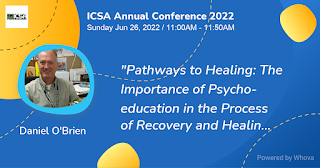Daniel O'Brien
Sunday, June 26, 2022
11:00 AM-11:50 AM
Individuals who leave cults frequently exhibit symptoms of mental illness, in particular: depression, anxiety and schizotypal disorders. While these symptoms can affect all former cult members, they are particularly problematic among young people who have left cults, and especially those born into one. Although there are a number of interventions that can help these people live full, productive lives with robust mental health, many do not take advantage of them for a variety of reasons, largely related to their cult indoctrination. Often cults stigmatize counseling and psychotherapy, causing many former cult members to fear seeking professional mental health treatment. For those that do seek help, it can be difficult to find appropriate counseling because not all therapists understand the significance of the cult experience. To address these problems, an extensive survey was conducted of the relevant, current research available on the subject. Although there is a vast amount of research available concerning mental illness and mental health, there is a relatively scant amount addressing the unique needs of former cult members. Nevertheless, what is available is quite encouraging in regard to positive outcomes for emotional and psychological healing. A key point among the findings is the recognition that “core dysfunctional beliefs and consequent negative thoughts” are central in the development of mental illness (Kinderman, 2005). When false and damaging beliefs are replaced with accurate, healthy beliefs and coping strategies, individuals begin to recover and thrive. Psycho-education, particularly in connection with traditional treatments for mental illness, can help empower individuals suffering with mental health issues by providing them with tools for coping and alleviating those symptoms. Significant challenges remain and need to be addressed in order to make this information more widely disseminated and available to those that need it most: former group members, their families, helping professionals, and researchers.
Daniel O'Brien
Educator
A former member of Jehovah’s Witnesses, O’Brien joined the religion in his early twenties and remained in it for two and a half decades. He served as a congregation elder for the last 20 years he was a Witness up until the time he discontinued his participation due to suffering a crisis of conscience concerning the conflict between his personal beliefs and the egregious hypocrisy of the leadership of the Jehovah’s Witness religion and their damaging, destructive policies and practices. As a writer and speaker, O’Brien focuses on how to heal emotionally and psychologically after leaving a cult, how to live a meaningful, authentic life and developing and implementing strategies to reach family members still in high-control, authoritarian groups. An experienced educator with more than two decades of experience in the classroom, Daniel has a Master's of Education degree which he earned at Concordia University, Irvine. Prior to that, he graduated Magna Cum Laude from California State University, Northridge with a degree in Music Education.


No comments:
Post a Comment
Was this article helpful?